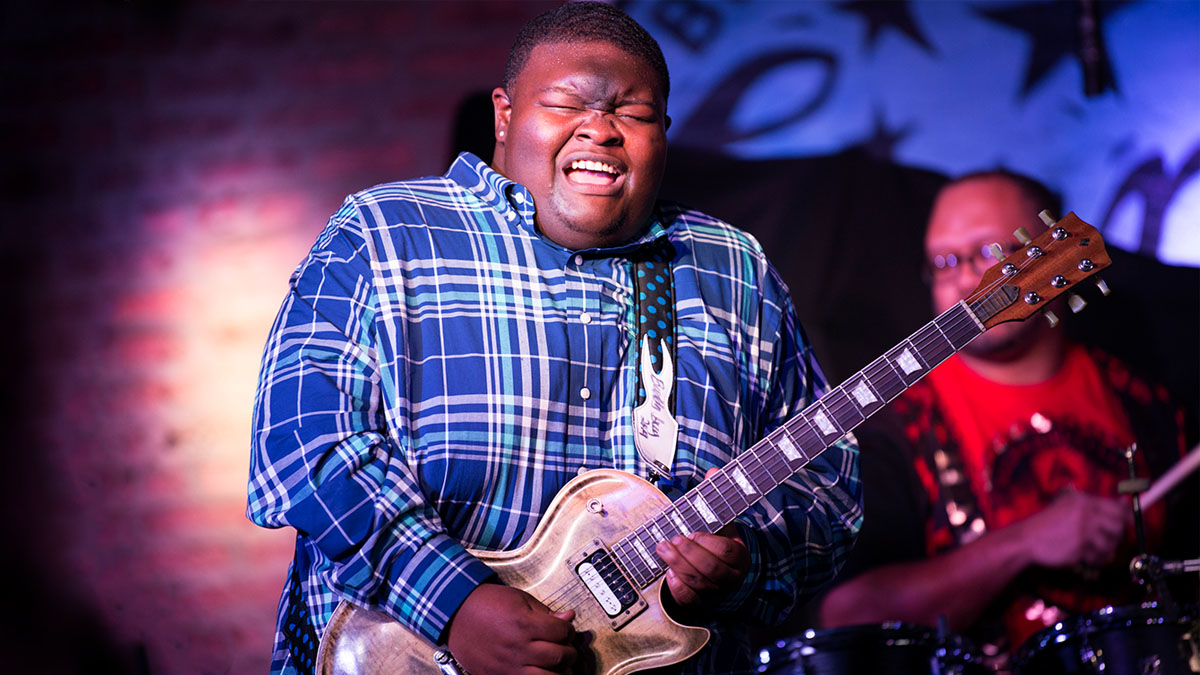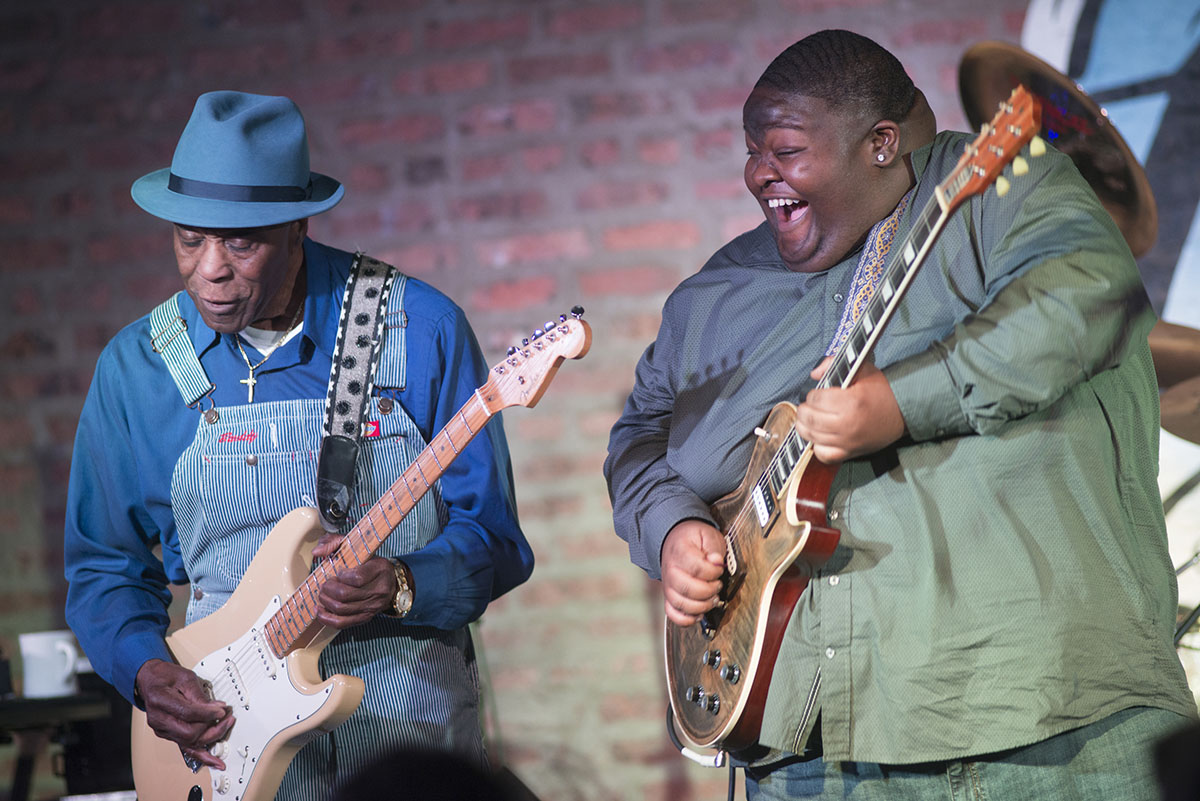Christone "Kingfish" Ingram: "There’s a lot wrong with the blues genre right now – a lot of people don’t think about the history and the significance of the actual culture"
The man they call “Kingfish” discusses the Delta blues tradition and the future of the artform – and how he worked through tragedy for his sophomore album, 662

Christone “Kingfish” Ingram, the 22-year-old heir to the Delta blues crown, is holding court with fans in Indianola, Mississippi, where he and nearly a dozen other guitarists are paying tribute to the “Blues Boy” himself, native son B.B. King.
After stepping off the stage strapped to a cherry red Gibson ES-335, he makes his way through the crowd and stops to serenade a young fan with a gentle phrase worthy of tonight’s honoree.
Before the night’s over, Ingram will debut the title track from his hotly anticipated second album, 662 [Alligator], and perform King’s 1953 single Woke Up This Morning (My Baby She Was Gone” with members of King’s backing band.
As part of an ensemble of guitar players that included Derek Trucks, Susan Tedeschi and Gary Clark Jr., Ingram was on hand to celebrate a 4,500-square-foot addition to the B.B. King Museum and Delta Interpretive Center, which opened in 2008.
The new wing tells the story of how King made his name on the road by playing an average 300 gigs per year for nearly three decades, and features a tour bus he purchased new in 1987 and rode for more than 12 million miles – enough for 25 round trips to the moon.
The gleaming motorcoach also serves as a metaphor for Ingram’s life, especially since dropping his Grammy-nominated and roundly applauded debut album, Kingfish [Alligator], in 2019. For the better part of a decade, Ingram had been a rising prodigy in the Delta blues scene, stunning audiences with his mastery of licks popularized by King and others.
As he grew as a player, thanks to lessons at the Delta Blues Museum in Clarksdale and his daily regimen of scouring YouTube for tips, he began to breathe the fire of Jimi Hendrix and Eddie Hazel into those 12-bar blues standards. That’s when things really started to cook for the young man christened “Kingfish” by locals in the Clarksdale, Mississippi scene where he grew up.
Get The Pick Newsletter
All the latest guitar news, interviews, lessons, reviews, deals and more, direct to your inbox!
In 2019 alone, Ingram toured extensively with Buddy Guy, who helped him record his debut, made his “Austin City Limits” debut, and opened for Jason Isbell during a seven-night residency at Nashville’s Ryman Auditorium. Since then, he’s headlined two North American tours of his own, dubbed “Fish Grease” and “Fish Grease 2,” and was Vampire Weekend’s hand-picked opener for multiple legs of their 2019-2020 tour.
Tragically, the grief of losing his mother, Princess Pride Ingram, in December 2019, overshadowed the triumphs of his touring successes and the five Blues Music Awards, four Living Blues Awards and Grammy nomination he earned.
He managed to keep the wheels rolling until the COVID pandemic forced him off the road in early 2020, when he holed up in the Friars Point, Mississippi, home he shared with his mother and recorded the tribute Rock & Roll to the woman who sacrificed so much to make Ingram’s dreams come true.
The stirring ballad, a composition by Nashville-based songwriters Ashley Ray and Sean McConnell that Ingram made his own, also marked the beginning of 662. Ingram soon reunited with co-writer and Kingfish producer Tom Hambridge, who has also worked with Tedeschi and Guy as well as Keb’ Mo’, Ana Popovic and Joe Bonamassa.
The results of the emotional rollercoaster the young guitar hero endured – and who, it should be noted, continues to exude joy and giddy enthusiasm for life, his instrument and music despite the trials – are on display throughout 662. Ingram’s hip-hop influences and developing interest in jazz surface on Another Life Goes By, a slow-burning blues with an adventurous solo set to a sampled beat.
He flexes his acoustic-guitar chops on You’re Already Gone and Rock & Roll, but brings it back home on the shuffling I Got to See You, the roadhouse romp She Calls Me Kingfish, and the title track (a nod to his home area code), signifying to audiences that although his sound has grown, his roots are undeniably Delta blues.
Guitar World grabbed some time with Ingram backstage at the B.B. King Museum before his afternoon set and the all-star finale to talk about the road that brought him back home on 662.

Your past two years have been a mix of triumph and tragedy, from releasing and touring your debut album to losing your mother in the middle of everything. How did you deal with that?
“We got right back on the road [after her death], I want to say like a month later. I think, when it came to a halt for me was when the pandemic happened, because I was going to use the road as an excuse to not think about it.
“Between not playing and being stuck in the house, at home, I had no choice but to think about it. It’s kind of strange; I didn’t really shed any tears at her funeral. I got through it just by playing and writing about it. We redid a song by Ashley Ray, Rock & Roll, [to make it] about her. I kind of put all the frustration, so to speak, in that song and in the writing that we did for it.”
How did your experiences touring with Buddy Guy and bands like Vampire Weekend expand your toolbox as a guitar player?
“Listening to Vampire Weekend soundcheck, listening to that show, we were listening to different melodies and stuff that you wouldn’t dare find in the blues. It was very inspiring because I can go home and try to add it to my blues and create a whole new sound or genre. Touring with Buddy Guy, playing with him made me want to brush up on my showmanship a little bit. Because he’s a showman.”
Did any of the melodies you picked up come out when you were writing 662?
“Yeah, because I wanted to do some stuff that was still blues but outside of the box a little bit. I think we really pushed the envelope. I think we did it with the first record, but I think the second record, we really went outside with adding different melodies and chord progressions. I was using different scales [such as Dorian and Mixolydian along with the pentatonic scale – Ed.]. I definitely had a chance to be more ‘out there’ with this record, for sure.”
What are your latest obsessions or interests in guitar?
“I’m at a place where I think I get the whole jazz guitar thing, like, trying to get to one chorus to the next with it. I think I’m at the point where I understand that, because I’m playing over chord progressions and I’m playing transitioning lines. I’m playing over chord changes. I think I’m not super-good with it, but I think I have an understanding of what it is now.”
How are you picking that up? You used YouTube a lot in your early days.
“Yeah, still YouTube. YouTube is great for finding all that old stuff, like Charlie Christian and Django [Reinhardt] and everything. I listen to guys who incorporate be-bop lines through their blues, like T-Bone Walker. Even new guys, like Josh Smith, out of California, or Kirk Fletcher.”
You’re a big Eddie Hazel fan, and you recently collaborated with Bootsy on his song Creepin’. How did that go down?
“We knew each other and had always wanted to do something. He came to us with the track, [and] at first he just wanted us to play on it. Then, he was like, 'I want you to write and sing some on it.' So, he told us the subject matter and my manager, myself, and our producer Nick Goldston, we actually brainstormed some of the lyrics. We got it recorded, he dug what he heard, and Creepin’ came out.”
It sounds like you’re just going off the whole time. Were you thinking of Eddie while you did that?
“Yeah, yeah. He said, 'Just go crazy on the track, man, just do you.' I was kind of scared, man, because you don’t know when too much is too much. He was like, 'Man, just go off.' It was in the key that most Parliament stuff was in back then, like E. It kind of put me, not necessarily in Maggot Brain mode, but his pentatonic stuff."
There’s a saying that you have your whole life to write your first record and six months to write your second. How did your growth manifest in these songs on 662?
“Man, just life itself. From going through the thing with my mom and meeting women, and going through other shit and all that. When we got off the road from COVID, I had a lot of things that were going on that I really didn’t write about, from my mom’s death and other stuff. Me and Tom Hambridge, we pretty much, I want to say every Thursday, from May all the way to September, we wrote like 20 songs. There’s stuff we wrote that we recorded that’s not even on the record. We got a lot done, for sure.”
In a previous interview, you talked about how there are two camps for blues fans: the people who want it to be the past and people who want it to be the future. Where do you fall?
“I come from Clarksdale, Mississippi, where the real stuff was born. I have that foundation. As I get older, my ear’s going to expand, and I like all types of music, so I feel like I’m going to experiment more. Right now, I just kind of accepted the fact that I’m kind of in a gray area, in a mix between the two. You ain’t going to please everybody.”
What guitars and amps are you playing right now?
“On the record, I used a Peavey T-60 on the more country, rockabilly-type songs. Like, on 662, I’m doing the lead work on that one. It’s on a song called I Got to See You, as well. I got a Peavey 6x10 Vintage, and a Peavey Classic Concert – a whole bunch of vintage Peavey amplifiers. I [also] used Michael Chertoff [with Jalen pickups designed by Greg Hessinger], a pink ’62 Strat reissue, a Custom Shop Strat that Fender made for me, and a Fender acoustic. For amps, I think it was a Fender Super Reverb, a vintage one.”
You’ve talked in the past about experimenting with different fuzz pedals. What do you plan to use on tour?
“Well, as far as pedals, my pedals went down tremendously. I used [an MXR] Sugar Drive and Dunlop Mini Wah, and I’m pretty much alternating between Peavey and Fender amps still. I’ve got a Way Huge Conspiracy Theory pedal I’m gonna use today. [For guitars] I’m alternating between the Strats and my Starcasters and my Chertoff, pretty much.”
You’ve had a lot of praise and expectations thrown on you. Do you feel any weight from people looking to you to carry on a tradition?
“Oh yeah, I definitely feel it. There’s a lot wrong with the blues genre right now. People that come along you think that are bringing something really authentic to the table, [and] people got to keep that thing on you; they’re like, you got to be the one to keep it going this way, but you got a whole lot of stuff that you want to do differently. I feel like that’s the pressure with that sometimes, but most of the time I’m just riding the wave, man.”
What would you say is wrong and what is right about blues now?
“A lot of people don’t think about the history and the significance of the actual culture when it comes to blues. Like, today: we have this lineup. I don’t think we’ve seen an all-Black blues lineup in years, which is kind of sad. With the African-American culture being the foundation of the blues genre, that’s sad. A lot of that’s going on, a lot of being a blind eye to the history in the preservation of the blues.”
- 662 is out now via Alligator.
Jim Beaugez has written about music for Rolling Stone, Smithsonian, Guitar World, Guitar Player and many other publications. He created My Life in Five Riffs, a multimedia documentary series for Guitar Player that traces contemporary artists back to their sources of inspiration, and previously spent a decade in the musical instruments industry.
“I suppose I felt that I deserved it for the amount of seriousness that I’d put into it. My head was huge!” “Clapton is God” graffiti made him a guitar legend when he was barely 20 – he says he was far from uncomfortable with the adulation at the time
“I was in a frenzy about it being trapped and burnt up. I knew I'd never be able to replace it”: After being pulled from the wreckage of a car crash, John Sykes ran back to his burning vehicle to save his beloved '76 Les Paul










